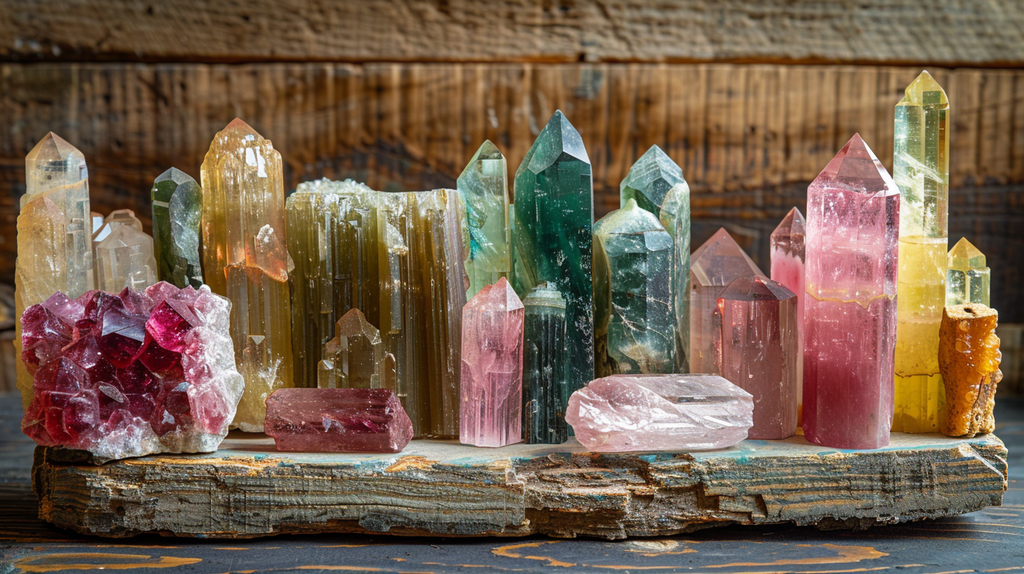
Tourmaline Stone: Virtues of Tourmaline
Tourmaline designates a group of minerals belonging to Silicates, more precisely to cyclosilicates, of complex and very variable composition .
By the term Tourmaline, we often mean “Black Tourmaline”. But, as we will see here, Tourmalines actually present a multitude of colors and varieties .
Its wide range of colors is explained by the different chemical elements that compose it (iron, manganese, nickel, cobalt, titanium, etc.).
- Origin of the name : Comes from the Sinhalese thoramali or thuramali
- Group belonging to : Silicates
- Color(s) : All colors of the spectrum
- Symbol : Protection
- Hardness : 7 to 7.5
- Deposits : Africa, America, Asia, Europe and therefore France
- Chemical composition: Complex silicates of aluminum borosilicates with iron, magnesium, alkalis.
- Day of the week : According to its dominant color
Varieties of Tourmaline
Tourmaline rarely appears in a uniform color (apart from black). It is usually available in a variety of transparent shades . Each has specific lithotherapy virtues associated with it.
Black Tourmaline is one of the most important protective stones in lithotherapy. As a result, it naturally protects against harmful waves (static electricity, mobile phone waves, etc.). It disperses nervous tension and stress
In addition, this stone increases vitality, energy and encourages a positive attitude .
By its color, Pink Tourmaline promotes love , desire and peace .
In this sense, it helps to suppress negative emotions and panic attacks and thus encourages fulfillment .
Although rare, this heart stone symbolizes the nature of love . It is a pure crystal , enemy of confusion and bad thoughts . This promotes a feeling of security and ease.
Through its color, it brings joy of life and has an energizing action . It also has a beneficial effect on sleep .
This color of Tourmaline promotes spiritual freedom , encourages tolerance and truth
It also helps dispel sadness.
This stone has benefits regarding relational ease . Indeed, it helps in understanding others and oneself .
Turquoise-colored tourmaline from Brazil, its rarity has meant that its deposit is already practically exhausted.
It is an extraordinary stone of communication and expression .
Benefits and virtues of Tourmaline
Tourmalines, as a whole and independently of their colors, present common virtues and properties in lithotherapy .
But each of the varieties has different properties , particularly depending on its color.
On the psychological level
From a psychological point of view, Tourmalines give self-confidence and help achieve goals .
Thanks to them, understanding of others and oneself will improve. In particular, they allow us to feel more empathy and compassion. They would also favor
reconciliation, as well as love and desire.
Among other things, Tourmaline stone contributes to wealth and prosperity.
The electrical qualities of Tourmaline give it a protective shield role. Tourmaline is known to protect habitats against bad vibes and negative energies.
Finally, it calms the nerves and strengthens the power of concentration .
On the physical level
It is possible to use Tourmaline stones to protect the nervous and digestive systems . Likewise, they strengthen muscles , bones and teeth .
Healing skin diseases can also be done with the help of Tourmaline.
Finally, this stone helps strengthen blood circulation and the immune system.
Chakras
The corresponding chakra is different depending on the dominant color of the stone.
So :
- Black Tourmaline is associated with the Root Chakra ,
- Pink Tourmaline and Watermelon at the Chakra Heart ,
- blue Tourmaline at the Third Eye Chakra .
Astrological signs
Tourmaline is associated with different astrological signs depending on its color.
So :
- Green and Black Tourmaline for Aries and Scorpio ,
- Pink Tourmaline for the Libra sign .
Recharging and purification
Tourmalines should be cleaned and purified frequently.
Place them under running tap water or in a glass container filled with distilled or salt water .
It simply recharges in the rays of the sun (without excess) or the moon, or even on a cluster of Quartz .
Meaning and History of Tourmaline
The name Tourmaline derives from the Sinhalese (Sri Lankan language) term Thuramali. This means according to the most common interpretation “ stone of mixed colors ”. This name was given to all stones whose name was not particularly known.
The word would have been brought to Europe by Dutch sailors as early as the 18th century .
Few texts clearly cite Tourmaline. It has often been confused with several other stones that resemble it. Even if some specialists today think that according to the descriptions of the ancients, Tourmaline had the name Ionia stone.
Tourmaline, relatively unknown in European kingdoms, found great success in the Orient and the Far East.
Figurines of deities and Buddhas were among the objects made with Tourmaline. It is also said that the ladies and empresses of the Chinese imperial court were fond of this stone.
In France, the electrical and electrostatic properties earned it the name Cylan magnet.














